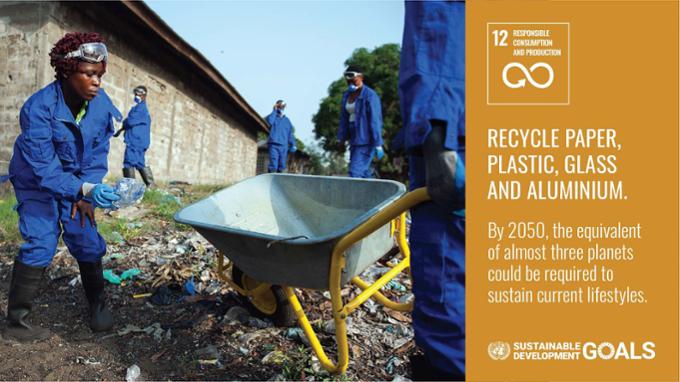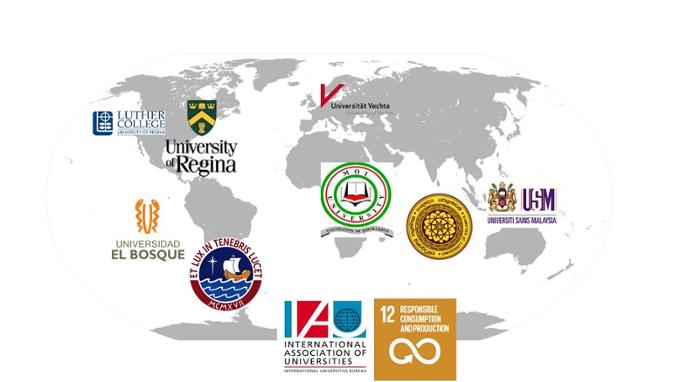Responsible Consumption and Production
Sustainable Development Goal 12 is about ensuring sustainable consumption and production patterns, which is key to sustain the livelihoods of current and future generations.
The University of Regina and Luther College co-lead Sustainable Development Goal #12 Cluster on Responsible Consumption and Production. The Cluster is an initiative of the International Association of Universities Global Cluster on Higher Education and Research for Sustainable Development.
The Cluster is composed of seven partner universities. The Cluster’s role is to engage with SDG 12 projects in teaching, research, leadership and campus operations, and promote the role of higher education in helping to achieve the SDGs and Agenda 2030. The Cluster holds regular virtual meetings and has helped to organize two international conferences, one international panel and one UN High Level Political Forum webinar since it was established in 2019.
Recycling on Campus
| Material | Location for Dropoff | Unit in Charge |
| Batteries | Green marked recycling bins (hallways) | Science Faculty |
| Cans, bottles | Marked blue bins (hallways) | Facilities Management |
| Cardboard | Blue dumpsters (loading docks) | Facilities Management |
| Chemical waste | Science Store | Science Store, Human Resources |
| Clean paper | Recycle bins (faculty offices) | Facilities Management |
| Construction waste | 306-585-5000 or Facilities.Management@uregina.ca |
Facilities Management and Planning, Design & Construction |
| Copper, other metals | 306-585-5000 or Facilities.Management@uregina.ca | Facilities Management |
| Fluorescent bulbs | 306-585-5000 or Facilities.Management@uregina.ca | Facilities Management |
| Kitchen grease | Beige bins (faculty offices) | Facilities Management |
| Latex, nitrile gloves | Custodial rooms | Facilities Management |
| Toner cartridges | mail.room@uregina.ca will pickup if wrapped to avoid leaks | Facilities Management - Mail Room |
Past News and Events
Related Courses
ADMN 210 - Introduction to Marketing
This course presents the fundamentals of marketing theory and application. Starting at a societal level, it works through environmental scanning, explores the differences between consumer and business customer groups, followed with a strategic focus on segmentation, targeting and positioning. Tactical applications of the marketing mix are then addressed - product, price, place and promotion. Attention is also directed to ethical and legal considerations.
***Prerequisite: ADMN 100 or BUS 100.***
*Note: Students may not receive credit for both ADMN 210 and BUS 210.*
ADMN 263 - Customer Service Strategies
This course covers customer service and responsible gaming concepts as applied to the service, hospitality, tourism, and gaming entertainment industries. It focuses on customer service strategies and covers concepts, issues, trends, and best practices related to responsible gaming, communication, relationship building, customer loyalty, diversity, and technological changes.
ADMN 275 - Operations Management
An introduction to the management of the operations function in organizations. Topics will include: forecasting, planning, scheduling, layout, control over quality, and quantity of output. Problems of production of goods and services will be considered.
***Prerequisite: ADMN 100 or BUS 100, MATH 103 or MATH 110, and STAT 100 or STAT 160.***
*Note: Students may not receive credit for both ADMN 275 and BUS 275.*
ADMN 305 - Philosophical Foundations of Business Management
This course introduces students to the principles and processes of how the philosophical foundations we use to construct our daily living impacts the way we manage businesses. The course is designed to give students a conceptual and practical knowledge of philosophy and its influence into the domain of problem identification, problem solving, and decision making. Students will learn to construct a paradigm of their leadership style and delve into using philosophy in their value systems, critical thinking, and use of authority.
***Prerequisite: ADMN 100 (or BUS 100) and 45 credit hours of university studies.***
ADMN 312 - Consumer Behaviour
This course examines the key concepts and theories in consumer behaviour, psychology, and other relevant fields. It addresses perception, personality, culture, and other topics to better understand consumer actions, motivations, decisions and response to various marketing strategies.
***Prerequisite: ADMN 210 or BUS 210.***
*Note: Students may receive credit for one of ADMN 312, BUS 312, or ADMN 412.*
BUS 275 - Operations Management
An introduction to the management of the operations function in organizations. Topics will include: forecasting, planning, scheduling, layout, control over quality, and quantity of output. Problems of production of goods and services will be considered. The course will also include an introduction to the use of quantitative techniques as an aid to organizational decision making.
***Prerequisite: ADMN 100 or BUS 100, MATH 103 or MATH 110, and STAT 100 or STAT 160.***
*Note: Students may not receive credit for both BUS 275 and ADMN 275.*
BUS 435AW - Advanced Operations Management
An advanced course that covers the management of operations in organizations. Topics will include: supply chain management, inventory management, aggregate planning, material requirement planning, scheduling, lean operations and JIT. Problems of production of goods and services will be considered. The course will also include an introduction to the use of quantitative techniques such as simulation and waiting line models as an aid to organizational decision making.
***Prerequisite: BUS 275***
ECON 269 - The Economics of Beer
This course explores the economics of the multi-billion dollars industries of brewing and selling beer; along with the myriad of regulations surrounding the production and consumption of alcoholic beverages.
***Prerequisite: ECON 100 or 15 credit hours***
* Note: Formerly numbered ECON 296AJ. Students may receive credit for only one of ECON 269 or ECON 296AJ.*
ECON 372 - Natural Resource Management on the Prairies
Problems in the prairie oil/gas, timber, uranium, potash, power generation and water management sectors; preservation of prairie ecosystems; application of theory to determine how best to deal with these problems.
***Prerequisite: ECON 201***
EMBA 816 - Production & Operations Mgmt
This course deals with the principles of designing, controlling, managing and improving the operations of an organization. Potential issues include process analysis and improvement for manufacturing and service organizations, supply chain management, lean operations, and quality management.
ENEV 422 - Solid and Hazardous Waste Management
Legislative trends; sources and characteristics of municipal solid waste; Recycling waste materials; Collection, transfer and transport; Disposal options; Sanitary landfill, incineration, composting and bioconversion; Management and Planning; Hazardous Waste-Problems, impacts and treatment/ disposal.
*** Prerequisite: ENEV 223 ***
ENEV 862 - Environmental Decision Making
Optimization modelling for environmental management systems. Linear programming, separable and integer programming, transportation models, dynamic programming, and their application to a variety of environmental engineering problems.
ENEV 863 - Air Quality Management
Advanced topics in air pollution impact assessment, mechanisms related to air pollution problems, mitigation and adapation of air pollution effects through a number of engineering measures, design of air pollution control facilities, air quality management and pollution control planning, and air quality prediction techniques.
ENEV 864 - Petroleum Waste Management
Generation of petroleum wastes and their impacts, treatment and disposal of petroleum wastes in exploration, production, and processing processes, remediation of petroleum contaminated sites, regulation related to petroleum wastes, and modeling for petroleum waste managment systems.
ENEV 865 - Hazardous Waste Management and Site Remediation
Principles of hazardous waste management. Subsurface contamination and contaminant migration. Risk-based site investigation and assessment. Discussion on different types of in-situ and ex-situ remediation technologies, including pump and treat, soil vapor extraction, air sparging, bioremediation, permeable reactive barriers, and other innovative technologies.
ENEV 866 - Industrial Wastewater Treatment and Reuse
Current and novel industrial wastewater management strategies; treatment process design theory and approaches; and industrial water/wastewater quantity and quality requirement.
ENEV 886CX - Waste Disposal Site Design and Operation
This is a directed reading course. A landfill-related research topic will be assigned at the beginning of the semester. Comprehensive literature review and analytical/experimental work will be conducted by the student. Student will meet with the instructor regularly throughout the semester and will submit a final report.
ENPC 864 - Petroleum Waste Management
Generation of petroleum wastes and their impacts, treatment and disposal of petroleum wastes in exploration, production, and processing processes, remediation of petroleum contaminated sites, regulations related to petroleum wastes, and modeling for petroleum waste management systems.
PHIL 272 - Contemporary Moral Issues
A philosophical consideration of such contemporary moral issues as racism, sexism, abortion, the right to privacy, adultery, homosexuality, capital punishment, pacifism, the obligation to obey laws, and social justice.
*** Prerequisite: PHIL 100 or completion of 15 credit hours ***
PHIL 273 - Biomedical Ethics
A philosophical examination of such issues as the definition and determination of death, rights of dying persons, euthanasia and natural death, and such moral questions in the physician-patient relationship as confidentiality, truth-telling and coercion against religious belief.
*** Prerequisite: PHIL 100 or completion of 15 credit hours ***
PHIL 277 - Ethical Issues in Science and Technology
Using a series of case studies, this class will examine ethical issues and controversies engendered by science and technology.
*** Prerequisite: Completion of 15 credit hours ***
PHIL 282 - Philosophical Issues in Sustainable Development
This course critically examines sustainable development from a philosophical perspective clarifying its various meanings, coherence, and implications. Underlying principles (such as the precautionary principle), relationship to other concepts (such as sustainable growth), and implied ethical obligations are explored. The merits of different sustainable development strategies are philosophically examined.
***Prerequisite: PHIL 100 or completion of 15 credit hours.***
*Note: Students may receive credit for one of PHIL 282 or PHIL 290AF.*
PHIL 290AN - Ethical Eating
Should we all be vegetarians? Should we eat only organic food? Only local food? Only food produced in a sustainable way? Should we worry about "cultural appropriation" of foods? This course will explore these and other such questions from a philosophical perspective.
***Prerequisite: PHIL 100 or completion of 15 credit hours***
PHIL 370AC - Technology, Privacy & Ethics
Technology, privacy, and ethics.
***Prerequisite: One 200-level PHIL course, or permission of the Department Head.***
*Note: Students may receive credit for one of PHIL 370AC or PHIL 470AC.*
PHIL 470AJ - Philosophical Dimensions of Sustainable Livelihoods
An examination of the meaning and significance of the concept of sustainable livelihoods through diverse philosophical lenses and as a strategy in advancing sustainable development. Its relation to other sustainability terms (e.g. sustainable lifestyles, sustainable consumption and production) and philosophical concepts (e.g. autonomy, agency) will also be explored.
**Permission of the Department Head is required to register.**
*Note: Students may receive credit for one of PHIL 470AJ or PHIL 370AJ.*
PHIL 880BK - Philosophical Dimensions of Sustainable Livelihoods
An examination of the meaning and significance of the concept of sustainable livelihoods through diverse philosophical lenses and as a strategy in advancing sustainable development. Its relation to other sustainability terms (e.g. sustainable lifestyles, sustainable consumption and production) and philosophical concepts (e.g. autonomy, agency) will also be explored.
**Permission of the Department Head is required to register.**
*Note: Students may receive credit for one of PHIL 880AK or PHIL 870AJ.*
SOC 355 - The Global Food System
A sociological lens on processes of food production, distribution, and consumption on a global scale. The course traces the historical development of the global food system and examines contemporary conflicts driving social change.
***Prerequisite: Completion of 30 credit hours, including completion of one 200 level SOC course, or permission of the Department Head.***
SOC 890AV - The Sociology of Alternative Food Networks
This course examines alternative food networks (AFNs) as sites of economic and social exchange, identity formation, and social practice. A particular emphasis is placed on AFNs as sites of ‘green’ or ‘ethical’ production-consumption, and the motivations of actors participating in these networks.
THEA 215AI - Costume Draping and Sustainability
This course is an exploration of recyclable materials for period costume making, with the help of basic principles of draping. Costume draping explores the concept of “artistic sculpting” instead of pattern making with formulas and numbers.

